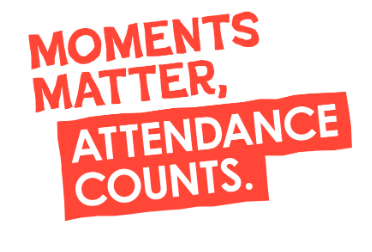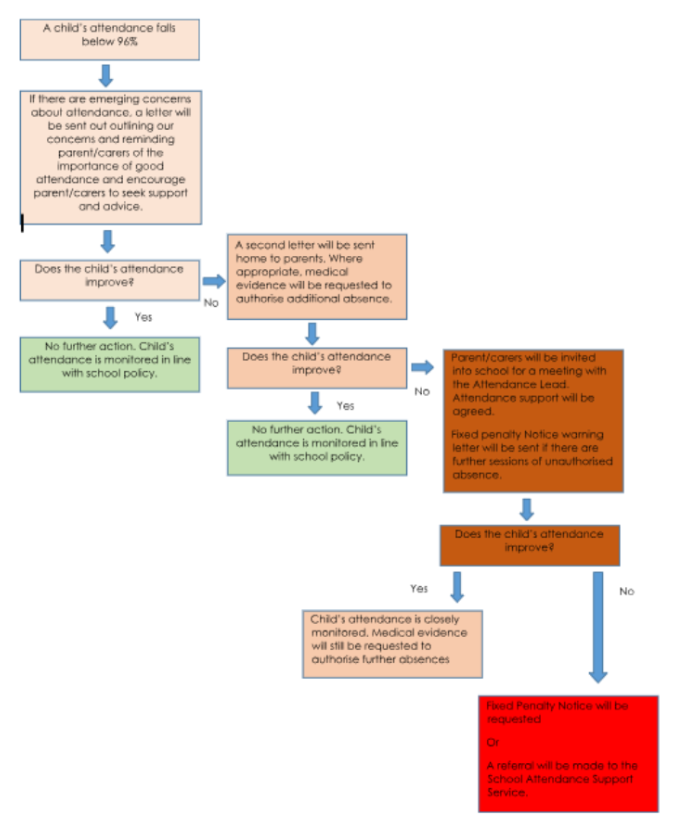Attendance

Attendance & Punctuality
'Being in school and having the best attendance possible underpins all the many benefits of school for your child, such as their learning, wellbeing and wider development'
|
Absence Calling Procedure: |
Contact details to use: |
|
Call School Office & leave a message before 8:30am |
02380767988 info@vermontschool.co.uk |
Is my child too ill for school? Click here for more information
At Vermont, we want every child to have the very best chance to shine. That’s why we follow the Department for Education’s Working Together to Improve School Attendance guidance.
Why does attendance matter?
Good attendance benefits everyone – pupils, families, schools, and the wider community. When children are in school every day, they:
- Achieve more academically
- Build strong friendships
- Grow in confidence and resilience
- Take part in the full range of experiences school offers
The facts speak for themselves:
- At Key Stage 2, pupils with higher attainment missed fewer school days.
- 84% of children with no absences met the expected standard, compared with only 40% of those who were persistently absent.
We know every family’s circumstances are different. That’s why our team works closely with you to overcome barriers and make sure your child thrives.
When can my child be absent?
Your child should be in school every day unless:
- They are too unwell to attend (see NHS advice: Is my child too ill for school?)
- You’ve had permission from the school for an exceptional circumstance
- Your family is observing a religious festival
- Transport arranged by the local authority is not available
- You are a gypsy/traveller family needing to travel for work
If your child cannot attend, please let us know as soon as possible:
📞 02380 767988
📧 info@vermontschool.co.uk
For safeguarding reasons, we must hear from you each day of absence. If we don’t, we will contact you—and if needed, follow up with a home visit or welfare check.
Illness and medical appointments
- Many mild illnesses (like coughs and colds without a temperature) don’t require a day off. The NHS guide can help you decide. Is my child too ill to attend school?
- Medical and dental appointments should be arranged outside school hours whenever possible. If your child has one during the day, they should attend before or after the appointment. Please provide evidence to the office.
Holidays in term time
Family holidays must be planned during school breaks. Leave of absence can only be authorised in exceptional circumstances, and holidays do not count (please see attendance policy regarding exceptional circumstances). Requests must be made in advance using a form from the school office.
Unauthorised absence for holidays may result in a fixed penalty notice or prosecution by the local authority.
Punctuality counts!
Being on time is part of good attendance. School begins promptly at 9:00am and registers close at 9:15am. Arriving late means missing important introductions and can leave children feeling unsettled. If your child arrives after 9:15am, you’ll need to sign them in, provide a reason and they will receive a late mark.
How we record attendance
Every morning and afternoon session is recorded with an attendance code. Some examples:
- M – Medical/dental appointment
- I – Illness
- G – Unauthorised leave of absence
- O – Unauthorised absence
- L – Late (before register closes)
- U – Late (after register closes – counts as unauthorised absence)
It’s vital to share the reason for absence so we can record it correctly.
Need help?
If you’d like guidance or support around attendance, please contact:
Mrs Sian Deltrieu, Attendance Lead
Sometimes children find it hard to attend school, and there can be many reasons why:
- If the issue is in school (like friendship worries), we will work with you to resolve it.
- If the challenge is wider (like transport or health concerns), we will work with the local authority to connect you with the right support.
Together we’ll agree on an action plan, If your child is struggling to attend school, school and your local authority also have responsibilities to help you to support your child’s attendance. At Vermont, attendance is reviewed weekly and closely monitored daily and then the team makes sure the right help is in place.
Our goal: to remove barriers so every child can thrive. 🌟
What happens if we are worried about your child's school attendance?
We keep a close eye on every child’s attendance so we can step in early if there are any worries. If we notice your child’s attendance starting to dip—perhaps because of illness or time away from school—we’ll be in touch.
This means a phone call or letter just to let you know and to see how we can help.Weekly emails will be sent to ensure you are kept up to date with your child’s attendance percentage.
Here is a flow chart of actions taken and how we’ll work the family and child to support accessing their education:

Where can I get support to help my child attend school?
Children may struggle to attend school for a wide range of reasons.
If your child is struggling to attend school, school and your local authority also have responsibilities to help you to support your child’s attendance.
If the barriers to your child’s attendance are in school – such as they are having friendship problems – the school is responsible for working with you to help overcome the issues.
If the barriers to attendance you or your child are facing go beyond the remit of the school – such as a transport or a mental health issue – both the school and local authority have a responsibility to help you. This includes helping you to access the wider support you might need, for example from the school nurse or from local housing or transport teams. As part of the conversation you have with us, we will agree a set of joint actions we will all take to help overcome any barriers to attendance. This agreement will often include a commitment to refer or help you to access support services in exchange for an agreement from you to engage and take part in the support offered. We will also arrange mutually convenient times for you to come together to review these and your child’s progress. This agreement may take the form of an informal action plan, an early help plan, or a parenting contract – depending on the complexity of the reasons for your child’s absence.
